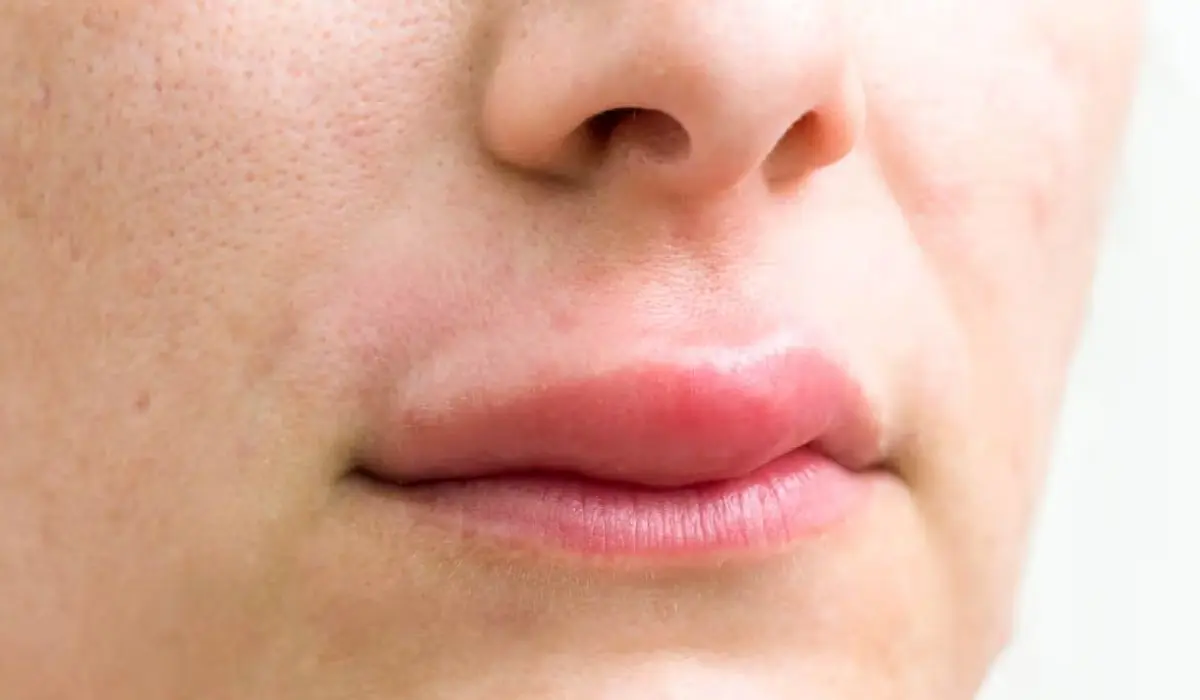Ever experienced waking up to a swollen face that leaves you resembling someone who’s had an unexpected encounter with a bee’s stinger? It’s a common occurrence that can significantly impact your self-assurance and comfort. However, fret not, for in this article, we will dig into the usual suspects responsible for a swollen, puffy face and share effective methods to address this predicament. Let’s embark on this journey!
What Causes A Swollen Face?
Facial swelling, also medically termed edema, transpires when fluids accumulate within facial tissues. This swelling can manifest in various facial regions, including the eyes, cheeks, and lips. Now, let’s unravel the intricacies behind those plumped-up cheeks.

➜ Allergies
Allergies have a notorious reputation for inciting facial swelling. When your body reacts to allergens such as pollen or pet dander, it triggers the release of histamines, causing your face to inflate like a balloon. Itchy eyes and a runny nose often accompany this unwelcome guest.
➜ Fluid Retention
Fluid retention can be another reason behind facial puffiness. Several factors can contribute to this, including an excessive intake of sodium, hormonal fluctuations, or even prolonged periods of sitting or standing.
➜ Sinus Infections
Sinus infections can also be the source of a swollen face. When your sinuses become inflamed and congested, pressure can build up in your facial region, leading to swelling. You may experience tenderness and discomfort around your eyes and forehead.
Home Remedies for Alleviating Facial Swelling
➜ The Calming Cucumber Compress
One of the most soothing remedies for a swollen face involves using cucumber compresses. Cucumbers boast anti-inflammatory properties that can effectively reduce puffiness. Simply slice a cucumber, chill the slices in the refrigerator, and place them over your eyes for a revitalizing experience.
➜ Hydration: Your Skin’s Lifesaver
Dehydration can exacerbate facial swelling, so it’s crucial to maintain proper hydration. When your body is adequately hydrated, it’s less likely to retain excess fluids.
➜ Elevate Your Sleeping Habits
Elevating your head with an extra pillow during sleep can help prevent fluid accumulation in your facial area overnight. It’s a simple yet effective trick that can yield significant results.
➜ Medical Interventions
For cases where allergies are the root cause of facial swelling, over-the-counter antihistamines can provide relief. These medications work by inhibiting histamine production, thus reducing inflammation and alleviating allergy symptoms.
➜ Diuretics: Shedding Excess Fluid
In situations involving severe fluid retention, a medical professional may prescribe diuretics. These medications facilitate the elimination of excess water from your body, consequently reducing facial swelling.
➜ Nasal Sprays: Confronting Sinus Woes
For individuals grappling with facial swelling due to sinus issues, nasal sprays can be a game-changer. They help alleviate congestion and alleviate the pressure responsible for the swelling.
When To Seek Professional Assistance?
Although most instances of facial swelling resolve with time or home remedies, certain situations warrant medical attention. Seek professional help if you experience:
- Difficulty breathing.
- Swelling following an injury.
- Unexplained swelling accompanied by other concerning symptoms.
- Consulting the Right Specialists
Depending on the underlying cause of your facial swelling, you may need to consult different specialists:
- An allergist for allergy-related swelling.
- A dermatologist for skin-related conditions.
- An ear, nose, and throat (ENT) specialist for sinus-related issues.
Preventing Facial Swelling
▪️ Keeping Allergies at Bay
To preempt allergic reactions, minimize your exposure to allergens. Maintain a clean living environment, invest in an air purifier, and contemplate using allergy-friendly bedding.
▪️ Monitor Sodium Intake
High sodium intake can trigger fluid retention. Reduce your consumption of salty foods and processed snacks, opting instead for fresh, whole foods.
▪️ Maintain Adequate Hydration
Sustaining proper hydration is imperative in preventing facial swelling. Aim to consume at least eight glasses of water daily, and more if you’re physically active or in warm weather.
Conclusion
Facial swelling, while uncomfortable and potentially distressing, can be effectively managed with the right knowledge and remedies. Remember, pinpointing the underlying cause is pivotal in determining the most appropriate course of action. Whether it’s allergies, fluid retention, or sinus issues, there exists a solution to help you reclaim your natural and radiant appearance.
FAQs
To alleviate facial swelling resulting from allergies, consider over-the-counter antihistamines, cold compresses, and minimizing exposure to allergens when feasible.
Facial swelling can arise from various factors, and most cases are not grave. Nonetheless, if you encounter severe or unexplained swelling, consulting a healthcare professional is paramount.
Indeed, certain medications can prompt facial swelling as a side effect. If you suspect your medication is responsible, consult your doctor to explore alternative options.
The duration of facial swelling hinges on its root cause. In many instances, it resolves within a day or two. If it persists, it’s advisable to consult a healthcare provider.
Yes, natural remedies such as cucumber compresses, increased water intake, and elevating your head during sleep can be beneficial in reducing facial swelling in specific cases. Nevertheless, it’s prudent to seek personalized advice from a healthcare professional when addressing this issue.

